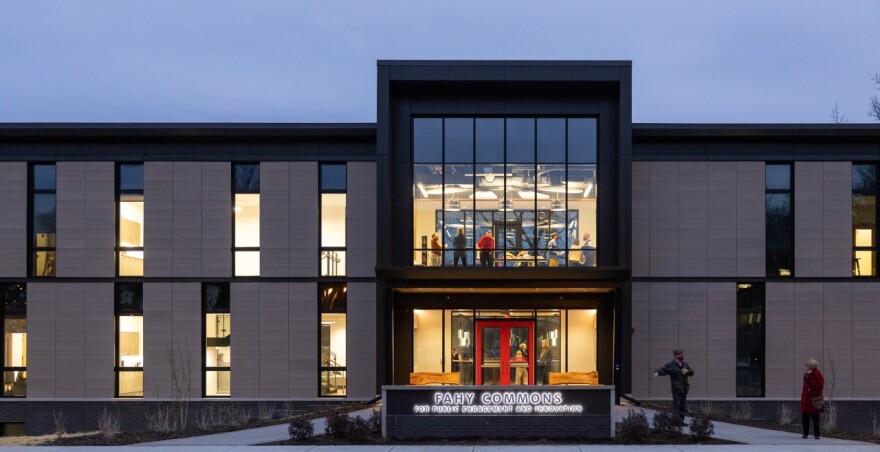ALLENTOWN, Pa. — Allentown's Muhlenberg College marked its 175th anniversary, and used the occasion to unveil a new building: the Fahy Commons.
At the ribbon-cutting ceremony, it was a rainy day — which is actually good luck, Muhlenberg President Kathleen E. Harring said, jokingly, because some of the building's plumbing uses recycled rainwater.
- Muhlenberg College in Allentown, started in 1848, celebrated its 175th anniversary
- The college held a celebration, and took the opportunity to unveil a new eco-friendly building: the Fahy complex
- Faculty and administration reflected on the centuries, and shared their vision for the next 175 years of the school
"I do need to tell you that the rain is good for our building," Harring said. "Because we are collecting all of that rain. We didn't exactly plan for it, but it is positive."
Harring reflected back on the private liberal arts college's 175 years in operation.

"Each of us understands in our own way, the impact of the past few years," she said. "We've seen the global pandemic, racial injustice, social unrest, and financial uncertainty caused significant pain and challenge for so many in our Muhlenberg community.
"But we've also seen over and over again, the good in our people, our collective strength. We've weathered the storm that we will weather the storm as a community."
"Each of us understands in our own way, the impact of the past few years, we've seen the global pandemic, racial injustice, social unrest, and financial uncertainty caused significant pain and challenge for so many in our Muhlenberg community, but we've also seen over and over again, the good in our people, our collective strength. We've weathered the storm that we will weather the storm as a community."Kathleen E. Harring, president of Muhlenberg College
Harring said her mission — as much as she can do in her lifetime — is to make the college's next 175 years more impactful than the last.
Fahy commons
At the backdrop of the tent-covered speeches in the rain, the college's newest building stood.
It was surrounded by grass with metal grates buried in it, for catching rain, and the windows had polka dots on them, to catch the attention of birds, and stop them from flying into the windows — a Muhlenberg research project, Harring said.

The window design is called "bird-friendly," and birds colliding into glass windows is an issue that's been getting more attention lately.

According to the college, the building mostly powers itself — using solar panels that line much of the roof. It also features high-efficiency heating and cooling systems, as well as rainwater harvesting systems for toilet flushing, and outdoor classrooms.

The lights inside the building are warm-colored LEDs, and it gave it a natural-lighting feel, even on a rainy day.
Faculty reflect on the anniversary
Before the ribbon-cutting ceremony, a panel of faculty and hundreds of alumni in suits, ties, and rain jackets gathered in the campus' Baker Theater for a talk.

On the stage, Muhlenberg professor and notable public opinion expert Christopher Borick shared what he thinks is so special about the learning environment at the college.
Borick gave an example of an exercise he likes to conduct while teaching his Public Policy course, in which he does simulations, having students pretend to be some sort of public figure, and they have to make pretend policy decisions.
He said that lets students think outside the box and challenge their beliefs.

"I'll take someone who is incredibly left-leaning [politically], and they'll represent the Fraternal Order of Police, or a conservative student, and they'll represent Elizabeth Warren," Borick said.
"And it forces them to think about these perspectives, not adopt their views, but at least acknowledge the arguments that are often put forth by these kinds of people that are trying to come up with policy solutions, and in the end and why those solutions aren't always optimal — is part of the game."
The other professors on the panel nodded and agreed. Borick added that what makes the exercise special is that no matter how confrontational the students get in this simulation exercise — the one ingredient that makes the atmosphere beneficial and friendly is trust.


